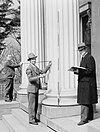File:Building 102, view of Klystron tube in amplifier housing showing top of tube connecting conductors. - Clear Air Force Station, Ballistic Missile Early Warning System Site II, One mile HAER AK-30-A-65.tif

Original file (4,242 × 5,329 pixels, file size: 21.56 MB, MIME type: image/tiff)
Captions
Captions
Summary edit
| Photographer |
Sims, Gregory Related names:
|
||||
| Title |
Building 102, view of Klystron tube in amplifier housing showing top of tube connecting conductors. - Clear Air Force Station, Ballistic Missile Early Warning System Site II, One mile west of mile marker 293.5 on Parks Highway, 5 miles southwest of Anderson, Anderson, Denali Borough, AK |
||||
| Depicted place | Alaska; Denali Borough; Anderson | ||||
| Date | 2001 | ||||
| Medium | 4 x 5 in. | ||||
| Current location |
Library of Congress Prints and Photographs Division Washington, D.C. 20540 USA http://hdl.loc.gov/loc.pnp/pp.print |
||||
| Accession number |
HAER AK-30-A-65 |
||||
| Credit line |
|
||||
| Notes |
|
||||
| Source | https://www.loc.gov/pictures/item/ak0486.photos.193550p | ||||
| Permission (Reusing this file) |
|
| Object location | 64° 20′ 39.01″ N, 149° 11′ 12.98″ W | View this and other nearby images on: OpenStreetMap |
|---|
File history
Click on a date/time to view the file as it appeared at that time.
| Date/Time | Thumbnail | Dimensions | User | Comment | |
|---|---|---|---|---|---|
| current | 22:51, 26 June 2014 |  | 4,242 × 5,329 (21.56 MB) | Fæ (talk | contribs) | GWToolset: Creating mediafile for Fæ. HABS batch upload restart 26 June 2014 (p21:101)x |
You cannot overwrite this file.
File usage on Commons
The following page uses this file:
Metadata
This file contains additional information such as Exif metadata which may have been added by the digital camera, scanner, or software program used to create or digitize it. If the file has been modified from its original state, some details such as the timestamp may not fully reflect those of the original file. The timestamp is only as accurate as the clock in the camera, and it may be completely wrong.
| Camera manufacturer | Sinar |
|---|---|
| Camera model | 54H |
| Author | Library of Congress |
| Width | 4,242 px |
| Height | 5,329 px |
| Compression scheme | Uncompressed |
| Pixel composition | Black and white (Black is 0) |
| Orientation | Normal |
| Number of components | 1 |
| Number of rows per strip | 15 |
| Horizontal resolution | 1,000 dpi |
| Vertical resolution | 1,000 dpi |
| Data arrangement | chunky format |
| Software used | Stokes Software Inc. IWS IWS - Version 1.4.0.4 |
| File change date and time | 10:54, 11 May 2006 |

